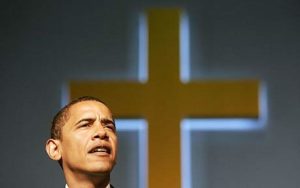by WorldTribune Staff, January 13, 2017
The number of Americans who consider themselves religious dropped steeply during President Barack Obama’s tenure, according to the Pew Research Center.
“When it comes to the nation’s religious identity, the biggest trend during Obama’s presidency is the rise of those who claim no religion at all,” Pew said in a report released this week titled “How America Changed During Barack Obama’s Presidency.”

When Obama was sworn in January 2009, those who identified as atheists or agnostics along with those who said their religion was “nothing in particular” totaled 16 percent of the U.S. adult population. Eight years later, as Obama leaves office, the non-religious in America now make up nearly 25 percent of the population.
Pew found that the percentage of Americans who say they believe in God, consider religion to be very important in their lives, pray daily and attend religious services at least monthly have all dropped during the Obama years.
Those who identify as Christians, America’s largest religious demographic, dropped from 78 percent of the U.S. adult population to 71 percent 8 years later.
According to Tim Schultz, the president of the 1st Amendment Partnership, the Obama administration often viewed religion as an enemy standing in the way of their policy objectives.
“They view religious freedom as a kind of inconvenient speed bump on the way to those objectives in some way,” Schultz said.
In a 2016 report, the U.S. Commission on Civil Rights (USCCR) attacked religious liberty as a guise for discrimination.
In the rollout of the report, Obama-appointed chairman, Martin R. Castro, stated that religious liberty was simply a justification for bigotry, prejudice and discrimination.
Castro claimed that the phrases “religious liberty” and “religious freedom” were “code words for discrimination, intolerance, racism, sexism, homophobia, Islamophobia or any form of intolerance.” He added that “today, as in the past, religion is being used as both a weapon and a shield by those seeking to deny others equality.”
“We now see ‘religious liberty’ arguments sneaking their way back into our political and constitutional discourse,” Castro said, “in an effort to undermine the rights of some Americans.”
In its “Findings and Recommendations,” the report sided with anti-discrimination laws over religious liberty, declaring that civil rights protections ensuring nondiscrimination are of “preeminent importance” in American jurisprudence, whereas religious exemptions “significantly infringe upon these civil rights.”
The USCCR also stated that religious exemptions from nondiscrimination laws and policies must be “defined narrowly.”
In its majority statement, the USCCR warned that threats to civil liberties, “cloaked as ‘religious freedom’ protection bills, are emerging in dozens of states and localities across the nation.”
